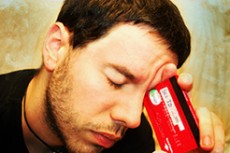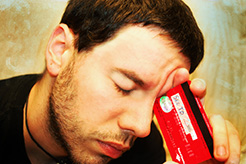By Katherine Barclay/ reporter
Credit cards can be a helpful financial tool if used responsibly, a banker from Branch Bank and Trust Co. told NE students Oct. 27.
Kayla Houston shared tips on how students can avoid “digging themselves in a hole.”

Bryan Rosengrant/flickr
Credit cards are helpful for making large purchases such as a house, car or college and for emergencies, but credit is also a privilege, she said.
Before a bank can approve someone for credit, it makes sure that person has a steady income and a good bill payment history, Houston said.
Credit also requires careful management. Houston stressed the importance of paying bills regularly and on time because interest rates can always increase. She advised students to borrow only for what they need and can pay back.
“If they don’t have the money for it right now, don’t buy it,” she said.
Ronnie De Manna, a market leader at BB&T, said applying for credit through department stores or gas stations is a good way to start to build credit. Students should only use credit cards to make large purchases, he said.
De Manna warned students that even though some websites claim their site will improve credit, it is not true. He said students should still check their credit, suggesting annualcreditreport.com as a useful site.
“Just by awareness, your credit will increase,” he said.
NE student Chris Withers said he already knew information but felt that the reinforcement was helpful.
“I figured it couldn’t hurt me, and I had the time,” he said.
To budget, students need to follow three main steps, Houston said. First, they should determine their income and the amount of money they receive regularly. Monthly expenses include rent, bills, groceries and child care. If that amount is greater than or equal to income, students must decide what are needs and what are wants, and reduce the amount of wants.
“Cutting down wants means making choices and planning ahead,” she said.
If expenses are less than income, students should begin to save for long-term and short-term accounts, she said.
Leftover money can be used toward paying down credit cards or loans and saving for emergencies. Students should strive for a 60/40 solution, Houston said, where 60 percent goes to essentials and 40 percent goes to savings or fun money.
Since almost all students who attended said they use a debit card, De Manna shared information on checking accounts.
“Checking accounts are a valuable tool for anyone with a steady income,” he said. ”It gives people somewhere to put their money and the ability to access it.”
He warned students to record transactions and be conscious of what they spend.
Students can keep track of their transactions, their available funds and transfers and deposit checks all online or through their phone with mobile banking.
The ability to understand how credit works and how to save money for the future is part of one’s success in life, De Manna said.

